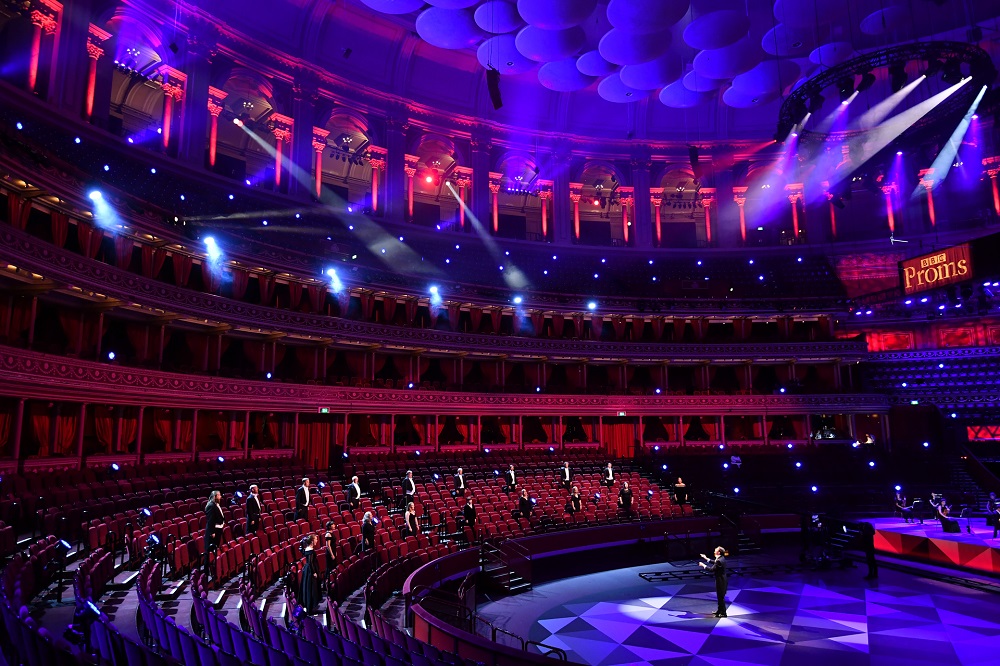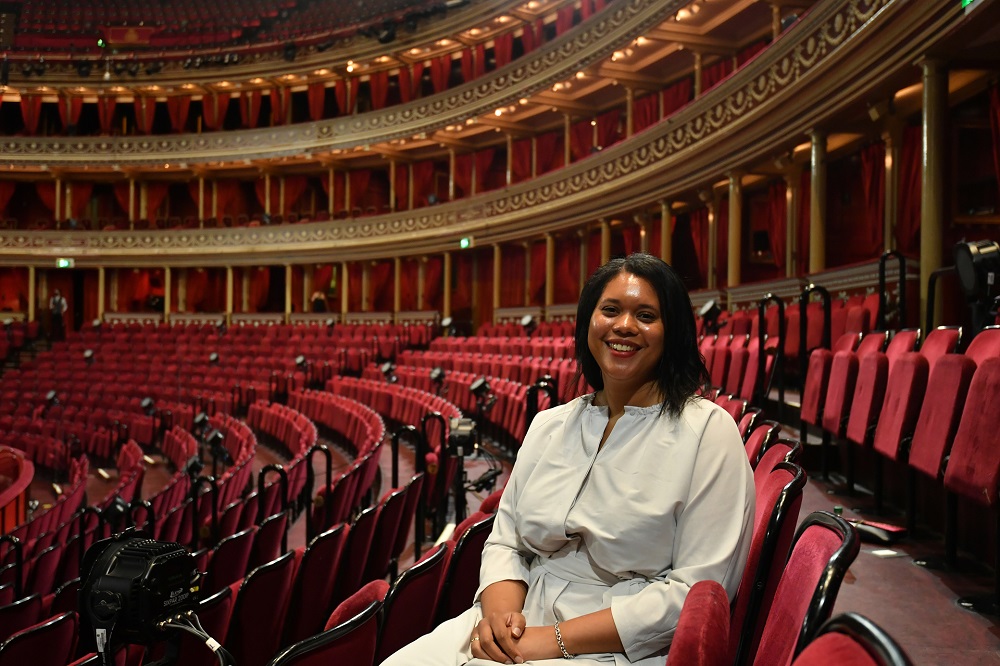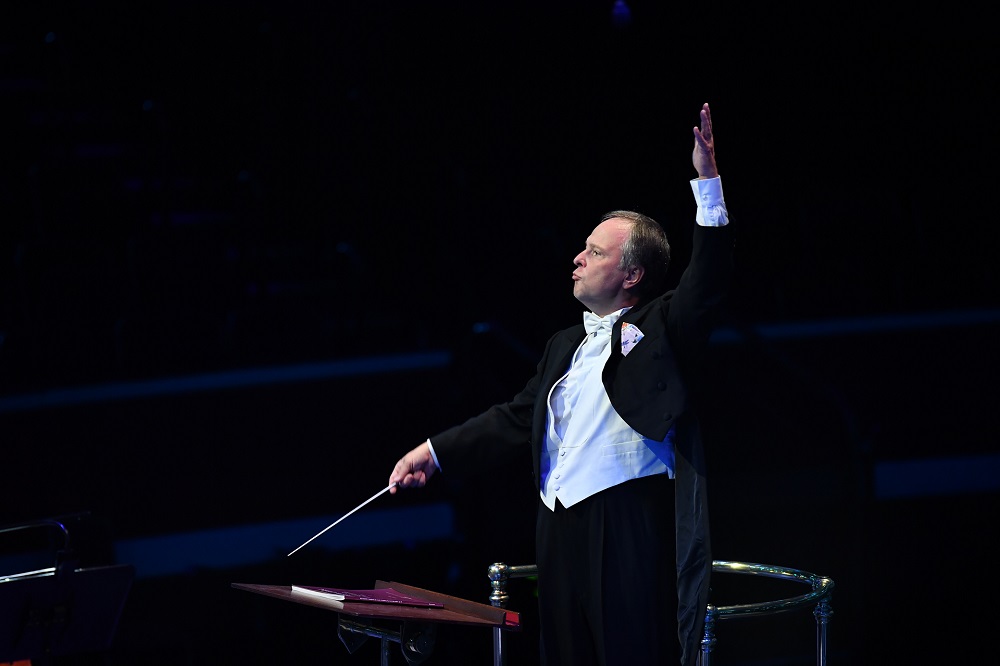BBC Proms live online: BBC Singers, BBCSO, Oramo review – threnodies to an empty hall | reviews, news & interviews
BBC Proms live online: BBC Singers, BBCSO, Oramo review – threnodies to an empty hall
BBC Proms live online: BBC Singers, BBCSO, Oramo review – threnodies to an empty hall
No joy in Beethoven without an audience, but reflective moods work well
So the bubble of reactionary brouhaha over the Last Night of the Proms quickly burst: there can be no argument about singing “Land of Hope and Glory” or “Rule, Britannia!” when they’re to be presented in their original Proms forms (Elgar’s Pomp and Circumstance March No.
Even in the first of the 16 Proms to be screened and broadcast live last night, mourning and melancholy hung like a pall. It was sensitive planning to begin in reflective mode, like the first of the Royal Opera’s three events back in June, before moving on to the three-quarters celebration of Beethoven’s Third (“Eroica”) Symphony. Certainly the short pieces by Americans Whitacre and Copland worked best, along with Beethoven’s second-movement Funeral March. Diversity has not yet hit the BBC Singers, but they sang exquisitely under Nicholas Chalmers, their spacing in the stalls visually striking and atmospherically complemented by the beams of light above. Whitacre’s setting of his friend Charles Anthony Silvestri's simple lyrics about the cusp of sleep is straightforwardly rewarding, spiced as usual with the occasional harmonic crunch, the final surrender to Morpheus hauntingly fading to nothing. Pure Albert Hall magic, except that we weren’t there and Katie Derham’s guests on BBC Two, Stephen Fry and Ayanna Witter-Johnson, would insist on rubbing in how exciting and thrilling it was that they were. 


- Watch this concert on BBC Two and/or listen on BBC Radio 3 for the next month
- Full programme of livestreamed BBC Proms here
- More classical music reviews on theartsdesk
rating
Share this article
Add comment
The future of Arts Journalism
You can stop theartsdesk.com closing!
We urgently need financing to survive. Our fundraising drive has thus far raised £49,000 but we need to reach £100,000 or we will be forced to close. Please contribute here: https://gofund.me/c3f6033d
And if you can forward this information to anyone who might assist, we’d be grateful.

Subscribe to theartsdesk.com
Thank you for continuing to read our work on theartsdesk.com. For unlimited access to every article in its entirety, including our archive of more than 15,000 pieces, we're asking for £5 per month or £40 per year. We feel it's a very good deal, and hope you do too.
To take a subscription now simply click here.
And if you're looking for that extra gift for a friend or family member, why not treat them to a theartsdesk.com gift subscription?
more Classical music
 Kempf, Brno Philharmonic, Davies, Bridgewater Hall, Manchester review - European tradition meets American jazz
Bouncing Czechs enjoy their Gershwin and Brubeck alongside Janáček and Dvořák
Kempf, Brno Philharmonic, Davies, Bridgewater Hall, Manchester review - European tradition meets American jazz
Bouncing Czechs enjoy their Gershwin and Brubeck alongside Janáček and Dvořák
 Solomon, OAE, Butt, QEH review - daft Biblical whitewashing with great choruses
Even a top soprano and mezzo can’t make this Handel paean wholly convincing
Solomon, OAE, Butt, QEH review - daft Biblical whitewashing with great choruses
Even a top soprano and mezzo can’t make this Handel paean wholly convincing
 Two-Piano Gala, Kings Place review - shining constellations
London Piano Festival curators and illustrious friends entertain and enlighten
Two-Piano Gala, Kings Place review - shining constellations
London Piano Festival curators and illustrious friends entertain and enlighten
 Echo Vocal Ensemble, Latto, Union Chapel review - eclectic choral programme garlanded with dance
Beautiful singing at the heart of an imaginative and stylistically varied concert
Echo Vocal Ensemble, Latto, Union Chapel review - eclectic choral programme garlanded with dance
Beautiful singing at the heart of an imaginative and stylistically varied concert
 Scott, Irish Baroque Orchestra, Whelan, RIAM, Dublin review - towards a Mozart masterpiece
Characteristic joy and enlightenment from this team, but a valveless horn brings problems
Scott, Irish Baroque Orchestra, Whelan, RIAM, Dublin review - towards a Mozart masterpiece
Characteristic joy and enlightenment from this team, but a valveless horn brings problems
 Classical CDs: Voice flutes, flugelhorns and froth
Baroque sonatas, English orchestral music and an emotionally-charged vocal recital
Classical CDs: Voice flutes, flugelhorns and froth
Baroque sonatas, English orchestral music and an emotionally-charged vocal recital
 Kanneh-Mason, Britten Sinfonia, Shave, Milton Court - a grin and a big beaming smile
A pair of striking contemporary pieces alongside two old favourites
Kanneh-Mason, Britten Sinfonia, Shave, Milton Court - a grin and a big beaming smile
A pair of striking contemporary pieces alongside two old favourites
 theartsdesk at the New Ross Piano Festival - Finghin Collins’ musical rainbow
From revelatory Bach played with astounding maturity by a 22 year old to four-hand jazz
theartsdesk at the New Ross Piano Festival - Finghin Collins’ musical rainbow
From revelatory Bach played with astounding maturity by a 22 year old to four-hand jazz
 First Person: Manchester Camerata's Head of Artistic Planning Clara Marshall Cawley on questioning the status quo
Five days of free events with all sorts of audiences around Manchester starts tomorrow
First Person: Manchester Camerata's Head of Artistic Planning Clara Marshall Cawley on questioning the status quo
Five days of free events with all sorts of audiences around Manchester starts tomorrow
 Goldscheider, Brother Tree Sound, Kings Place review - music of hope from a young composer
Unusual combination of horn, strings and electronics makes for some intriguing listening
Goldscheider, Brother Tree Sound, Kings Place review - music of hope from a young composer
Unusual combination of horn, strings and electronics makes for some intriguing listening

Comments
I agree with much of this
Thanks for your comment. Don
Thanks for your comment. Don't get me wrong: I thought it was beautifully played, too. Given the circumstances of having to watch online rather than being there, my response might well be more than usually subjective. Quality of playing and singing throughout was never in doubt.